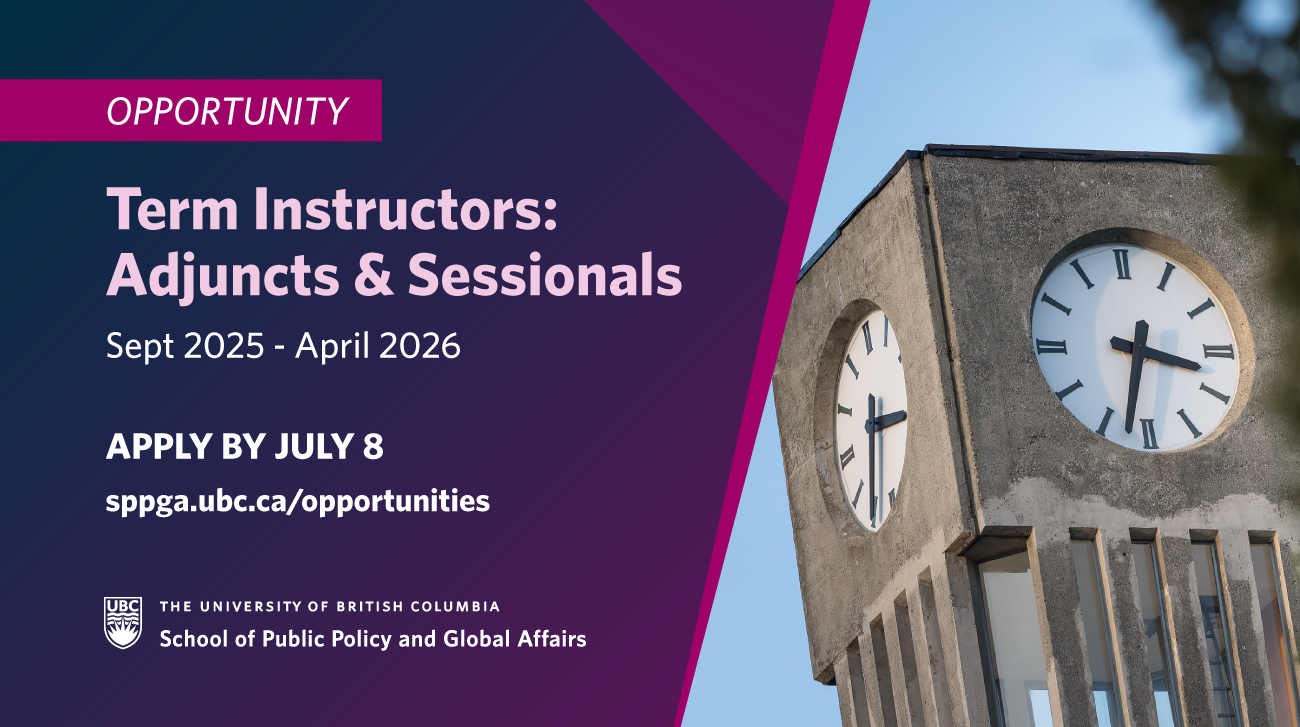The 26th UN Climate Change Conference of the Parties (COP26) in Glasgow has recently concluded. Temitope Onifade, PhD candidate at the Allard School of Law and Co-chair of the Liu Institute Network for Africa at the Liu Institute for Global Issues, UBC School of Public Policy and Global Affairs, University of British Columbia participated as part of the UBC delegation of faculty and students.


SPPGA: Congratulations on your participation in the UBC delegation to COP26! Could you please tell us about your goals for attending?
I had two main goals: learn more about climate policy and justice under the Paris Agreement; and share my knowledge about Canada’s climate governance.
Having been trained in law and policy, my previous research has focused on business as usual: looking at how laws and policies use technologies and markets to address the challenges of climate change. For instance, I have worked and published on renewable energy and sustainable finance. However, reflecting on my lived and professional experience practicing law in the notorious Niger Delta and South-West Nigeria made me realize the environment-development justice gaps in law and policy.
I have taken steps to contribute to addressing these gaps through policy and academic initiatives, for instance by working with some amazing people to form Holistic Sustainable Development Network International, co-found the Liu Institute Network for Africa, and lead the design of the “Re-imagining Agenda 2063” project as platforms for addressing justice-related development challenges. Seeing some justice issues in Canada has inspired me to think more about how to strengthen climate law and policy. COP26 was an opportunity to learn more about these gaps and how to strengthen climate law and policy to address them.
As part of my contribution to addressing these gaps, I have also been doing some research on the interwoven private and public governance of climate finance, corporate responsibility and other business-related actions, often locating my contributions within the broader public policy and justice context. Some of my recent work as a researcher for Canada Climate Law Initiative, UBC, and Commonwealth Climate and Law Initiative, University of Oxford, has helped me spend more time thinking about the role of, risks facing, and opportunities awaiting corporations, financial institutions, corporate and financial directors and officers, regulators and other corporate and investment actors in Canada, often within the broader context of international and transnational politics and law. For instance, as a consultant for Commonwealth Climate and Law Initiative, a research program based at the University of Oxford but operating across Commonwealth countries, I have collaborated with colleagues to caution on the emergence of foreseeable biodiversity-related liability risks for financial institutions. Given this type of work I have been doing, which has sought to really address the private sector directly, I thought COP26 would be an excellent opportunity to share some of my findings, get useful feedback and learn from people from other parts of the world.
SPPGA: How does your participation in COP26 connect with your research interests?
My main research area is climate policy, with specific focus on the regulation and governance of climate change and low-carbon economies. I also spend time thinking, writing and speaking about other related issues in the fields of environment and development. These interests immediately suggest that COP is the biggest gathering of the movers and shakers in my field.
Participating at COP26 offered the opportunity to learn more about the issues I struggle with every day, share my research with other like-minded people and leaders, and network with some of the key policy makers, practitioners and scholars in my area.
SPPGA: The COP26 summit brought parties together to accelerate action towards the goals of the Paris Agreement and the UN Framework Convention on Climate Change. In your opinion, what needed to happen at COP26 to ensure urgent action is taken to address global climate change?
Anyone following the science knows that, as the IPCC has told us, we cannot avoid some significant climate impacts, but COP26 is probably the climax for the dream of reducing devastating climate disasters. Many things should happen to really mitigate the potentially devastating impacts of climate change, especially the tipping points, but two of them, on implementation and justice, are the most significant in my view.
First, countries need to increase not only their ambition drastically to meet the scale and speed for addressing the urgency of the global climate emergency, but also take steps to implement ambitions and promises right away. For instance, Canada should increase its national mitigation ambition of reducing GHG emissions by 40 to 45 percent based on 2005 levels by 2030 to at least 45 percent based on the 2010 levels to make meaningful impact, and then implement this immediately through the mechanisms under the Pan-Canadian Framework, for instance carbon pricing covered by the Greenhouse Gas Pollution Pricing Act 2018, reporting and other transparency mechanisms under the Canadian Net-Zero Accountability Act 2021, and the policy schemes outlined in Canada’s latest climate plan, “A Healthy Environment and a Healthy Economy,” which looks at multiple sectors. I do not suggest this is enough, but it would be a positive signal that we have some hope.
Second, countries should implement and increase ambition and action on the justice-related issues promptly. This is the most recurrent theme across panels, plenaries, consultations, and press briefings in week two of COP26. In fact, if you look at the agenda, most items are about climate justice, for instance youth and public empowerment, gender, nature, adaptation, loss and damage, finance, capacity-building, and resilience. Even the High-Level Climate Champions, who initially focused on emissions mitigation initiatives, have created the Race to Resilience initiative as a way to address the justice-related gaps in the Race to Net Zero Initiative.
Also, parties from the least developed countries were clear that adaptation would remain their priority rather than mitigation. They showed their concerns that the failure of previous COPs to pay enough attention to loss and damage is not acceptable.
Disappointingly, of the various vulnerable groups, Indigenous peoples received the least attention in the official UK Presidency agenda and activities within the blue zone where the state negotiations take place. They have their panels at side events, but I did not see the UK Presidency agenda give them significant attention. Look at the overview of the UK Presidency program to get a sense of what I mean. It seemed to me that the assumption was that Indigenous peoples were covered under the discussions on developing countries. However, we know that there are unique climate-related concerns of Indigenous peoples within developed countries that may not be addressed within a discussion about developing countries. For instance, there are concerns about the relationship between the colonial crown and Indigenous nations in the understanding and political approach to land and resource rights in Canada, but you may not find this kind of dynamic in numerous developing countries, including those with a colonial past.
SPPGA: What did you learn at COP26? Who did you meet?
I have had the privilege of participating across plenaries, panels, consultations, side events, and movements at COP26. I could not attend most press briefings in person, but I accessed them through my designated delegate credentials for the COP26 Platform, an online hub that gives access to documents and videos from the conference.
From my observation of the negotiations and interactions with people across the pavilions and the “Fridays for Future” Climate Strike Movement, perhaps the most outstanding central lesson for me is about the North-South and state-civil society dynamics in global climate policy. Specifically, as far as COP26 is concerned, I think that the North-South divide is fading while the state-civil society divide seems to be increasing, but I know things may change in the future.
The North-South divide is fading because the fundamental grounds for disagreement are reducing. For instance, unlike previously, most developed countries no longer deny responsibility for causing climate change or the idea that they should provide finance, technology and other forms of support to developing countries. Almost every official delegate from developed countries accepts responsibility for causing climate change and for leading in the provision of climate finance and technology for developing countries to mitigate and adapt. The debate is now more about how to provide these forms of support. There are also uncertainties about what loss and damage mean as compared to adaptation, and some delegates and speakers from Canada and the World Bank were concerned about transparency and accountability in the allocation of international finance.
Meanwhile, the state-civil society divide is increasing. Activists insist that governments are not doing enough, with some going as far as saying that nothing good could come out of COP26. Young activists especially doubt that the adults representing governments in the negotiations are likely to make much difference. Greta Thunberg has already been quoted for saying COP26 is a failure, and Vanessa Nakata from Uganda made a touching plea to state delegates from developed countries to take action and prove activists wrong. Greta makes the valid point that we cannot solve the far-reaching problems of climate change with business-as-usual, by doing the same things that got us into this mess. Vanessa made many people speechless after pointing out how developed countries and businesses are making promises and failing while people are dying in poor, climate-sick countries.
For me, the fundamental challenge is how to reconcile the need for transformational change with the realities of power and self-interest, considered against the backdrop of the serious collective action and sovereignty problems underlying the failure of climate policy.
Outside the official business at COP26, the people I met that I considered the most important, based on my interactions with them, are from UBC. I had the privilege of chatting with two generous UBC delegates, Drs. Robert Godin from the Department of Chemistry at the Okanagan Campus and the outstanding Dr. Rashid Sumaila from the Institute for the Oceans and Fisheries and the School of Public Policy and Global Affairs.
I shared some ideas with Robert on my plans as a young scholar. He was very pleasant and shared genuine, helpful information. Young scholars need to learn from other young scholars, not only senior ones.
Later, I met Rashid and found him incredibly pleasant and generous! We have exchanged ideas on doing and leading multidisciplinary work, publishing in the most reputable journals such as Science and Nature, and deciding on places to take up work positions— I have taken him as a mentor on these things and look forward to learning from him. He is already leading the UBC team on a co-authored article, drawing on our participation, that we are planning to publish in Nature.
Another exciting person I met was Dr. David Tindall from the UBC Department of Sociology. He was extremely nice and surprisingly humble. We exchanged ideas about climate justice, and I asked him questions about how to evaluate the impacts of social movement. CBC also interviewed us for an article, giving me the sense that we share significant views on climate justice and movements.
SPPGA: Were there unexpected insights that you’ve gained or moments that you’ve had during your participation at COP26?
Yes! There are many insights, but I will touch on three that I think are among the most significant: the role of private finance in low-carbon transition; the changing importance of loss and damage; and climate finance delivery planning for developing countries.
First, from the contribution of Hon. Mari Pangestu, Managing Director of Development Policy and Partnerships of the World Bank, I got the sense that most businesses and some financial actors want governments to de-risk low-carbon transition before they then divert their resources to it. In other words, governments should first spend our taxes and other public resources to reduce the risks for corporations and financial portfolios to do business in a low-carbon economy. This reasoning aligns with business-as-usual based on neo-economic thinking about investment.
However, I think it is incredibly short-sighted. Physical, transition, liability and other types of climate-related risks are already in the real and financial economy, not something in the future: natural disasters are happening as a result of climate change, new low-carbon and other climate-related policies and laws are cropping up, and court cases challenging climate inaction and inadequate action are increasingly successful. I am not sure why any smart company, corporate director or officer, fund manager, or investor would not mitigate these rapidly evolving physical, transition and liability risks. As I concluded in an article I published a few years ago, corporate and financial actors need to think long-term. They can save money and their exposure to these risks while becoming leaders in the profitable low-carbon economy. They may event get public awards and social license and capital doing so, like what we have seen from the Global Climate Action Awards at COP26.
Second, loss and damage, as a policy agenda and a practical matter, is gradually becoming something developed countries cannot run from. Carina Bachofen from the Red Cross Crescent Climate Centre explained that there would be limits to adaptation as climate impacts become unavoidable. As I have explained in a recent paper, adaptation actions often target limiting potential climate impacts while actions on loss and damage address harms that have occurred. More harms will mean more actions to address loss and damage, and the slower these actions, the more costly, financially and otherwise, they become. Meanwhile, Prime Minister Mia Mottley from Barbados passionately explained that the challenge of addressing loss and damage in the Caribbean is closely linked to national debt. Many countries in that region borrow money to address climate-related disasters, making it important to take a systemic view of these challenges.
Third, I was pleasantly surprised to learn from Hon. Steven Guilbeault, Canada’s new Minister of Environment and Climate Change, that Canada has worked with Germany to create a climate finance delivery plan for developing countries. I am proud of Canada for taking this lead. However, the plan seems to focus on delivering on the USD 100 billion Green Climate Fund, which is itself limited. Anyone remotely familiar with climate finance would know this amount is inadequate, that climate finance should flow from numerous public, private and hybrid sources. While this plan is a starting point to ensure funds quickly flow to vulnerable developing countries, communities and people that need them, we need to scale up climate finance fast. But again, kudos to Canada for taking the initiative.
Also, I was happy to hear the minister talk about some of the problems of climate finance. I have experienced these problems first-hand as a legal practitioner at Lex Luminaire Solicitors, a law firm in Nigeria, where my partners and I tried but failed to get low-carbon incentives for our clients under the clean development mechanism of the Kyoto Protocol. Some of these challenges are due to well-known problems of energy and climate governance that are not unique to developing countries, including regulatory capture and other forms of regulatory failure. However, hearing the Minister talk about them gave validation to what I have been feeling for the seven years I have left active legal practice and gives me a renewed motivation to revisit those challenges.
Thank you Temitope.


